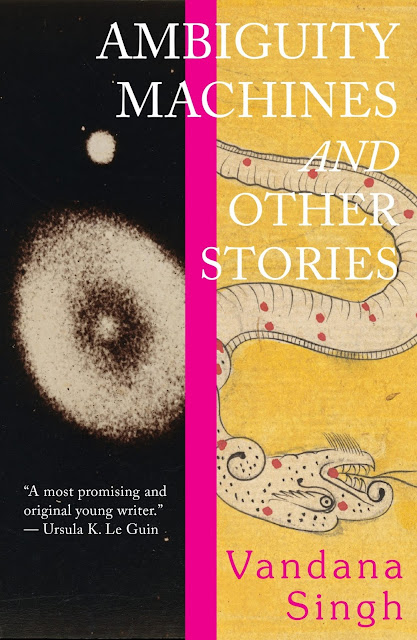Ambiguity Machines and Other Stories by Vanana Singh
For the Los Angeles Review of Books, I wrote about one of my favorite recent collections of short stories, Vandana Singh's Ambiguity Machines, published by the great Small Beer Press:
There is a stately elegance to all the stories collected in Ambiguity Machines and Other Stories, Singh’s second collection after The Woman Who Thought She Was a Planet and Other Stories. Both books are rich with models of what science fiction can achieve as well as models of the short story as a form. Even when she is writing about far-future, faster-than-light-traveling aliens, Singh never resorts to the clichés familiar from space opera unless to undo them, never forces fast pacing with staccato sentences and short paragraphs, never plays gotcha! with the reader. Singh is a scientist — a professor of physics — and all of her stories show a scientist’s determination to develop ideas carefully and responsibly.
Yet Singh is also an artist, a writer who evokes sensual wonders in musical prose. Hers is a literature of ideas, but it is also a literature of myth and intertextuality in which stories are material things, living things, organisms that transmit knowledge, feelings, history, and magic. Stories are themselves ambiguity machines of a sort, and one of the strengths of Singh’s stories is that they do not balk at ambiguity, but embrace it. Few science fiction writers have as Chekhovian a sense of both story and world: a sense that the best stories suggest at least as much as they state, and that the world exists through interconnections of people and places, humans and other creatures, natural landscapes and technological innovations. The ending of Chekhov’s “Gusev,” in which a corpse tossed overboard is considered by pilot-fish and a shark while the ocean contemplates the sky — such an ending has what we might call a Singhian movement to it as the narrative point of view insists that the wonders of the universe are not exclusive to humans alone, and that we, the readers, must expand our perspective and sympathy beyond our selves.
Continue reading at LARB.
